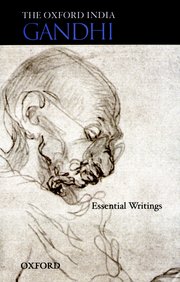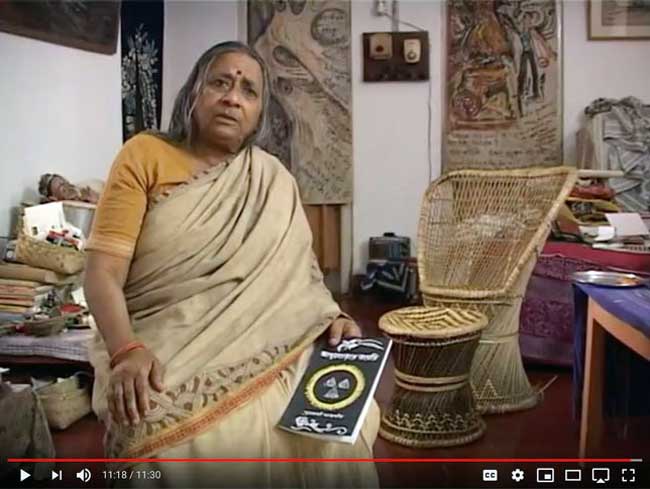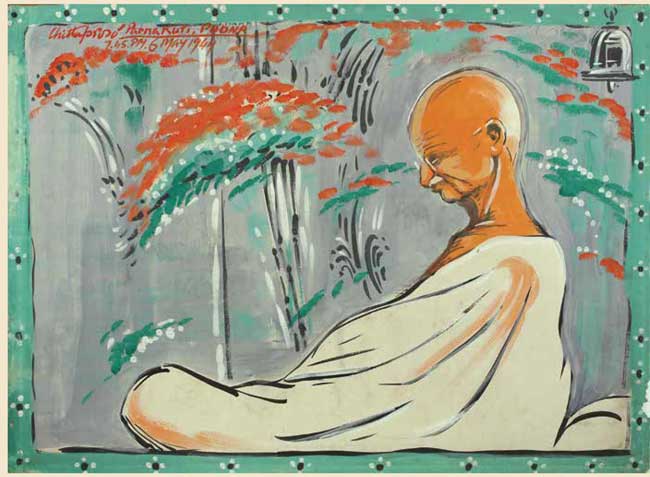The exhibition, “A Disappearing World: Ancient Traditions Under Threat in Tribal India” [held at the Brunei Gallery at SOAS from April 13 to June 25, 2011]. Seminars are also being held to discuss the suffering of the tribals.
The photographs have been taken by an American, Robert Wallis, who said: “The adivasi artists are using their art to raise awareness about their ancient cultural traditions that are threatened by mining, along with their entire way of life.” […]
But the opposite argument was also put. Although the adivasis “have no papers to prove their ownership of the land”, “they have farmed, hunted and fished Jharkhand’s fields, forests and rivers for millennia and their worship of natural deities and the stone megaliths of their ancestors give them a sacred sense of belonging to the land. But with the minerals below that land acquiring a new value, outside prospectors have moved in to make their fortunes.”
Wallace asked whether it was fair that the tribes people should suffer so that urban India could prosper. “This (issue) is not unique to India but India is the second fastest growing economy in the world.” […]
The exhibition quotes the words of Supreme Court judge Aftab Alam: “It is very often the process of development that most starkly confirms the fears about our democracy. A blinkered vision of development, complete apathy towards those who are highly adversely affected by the development process and a cynical unconcern for the enforcement of the laws lead to a situation where the rights and benefits promised and guaranteed under the constitution hardly ever reach the most marginalised citizens”.
Wallis said: “An announcement was made at the end of a seminar by the Gandhi Foundation that one of the nominees for its annual peace award is Bulu Imam for his work to protect adivasi culture through the Tribal Women’s Artist Collective and to protect the Jharkhandi environment where 30 new coal mines are planned in the coming years.”
“The other nominee announced, he revealed, “was Dr Binayak Sen, who has just been released from jail.”
Source: “Jharkhand’s ‘hell’ in UK – Glare on corporates at London show of photos, tribal art” by Amit Roy (Telegraph, 21 April 2011)
Address : http://www.telegraphindia.com/1110421/jsp/frontpage/story_13881604.jsp
Date Visited: Fri Oct 28 2011 11:36:32 GMT+0200 (CEST)

Library copies: Worldcat.org >>
Gandhian social movement >>
“Air is free to all but if it is polluted it harms our health… Next comes water… From now on we must take up the effort to secure water. Councillors are servants of the people and we have a right to question them.” – Mohandas K. Gandhi, Ahmedabad address on 1 January 1918; quoted by his grandson, Gopalkrishna Gandhi, in On another New Year’s Day: Mahatma Gandhi’s ‘khorak’ a 100 years ago | Learn more >>
Why Gandhi’s use of oxygen as a metaphor during the freedom struggle has resonance for India today
Freedom of opinion and freedom of association are ‘the two lungs that are absolutely necessary for a man to breathe the oxygen of liberty’, he wrote.
“One who owes his oxygen to the pump is a dying man. Is it any wonder that India is in a dying condition?”It wouldn’t be unreasonable to assume that these lines were written by someone deeply agonised by the deaths of thousands of Indians during the Covid-19 second wave in April and May. As it turns out, those sentences actually appeared in Young India on July 6, 1921. They were written by Mohandas Gandhi. A few months later, on March 5, 1922, he used the metaphor again. “India does not get enough oxygen and feels suffocated,” he wrote in Navajivan.
Gandhi’s invocation of this image of people gasping for oxygen appeared shortly after India had been devastated by the influenza pandemic that started in 1918. It buffeted the country in four waves before it ended in 1921. David Arnold estimates that 12 million Indians – 5% of the country’s population – died in the pandemic. Like with Covid-19, influenza affected the functioning of the lungs.
The pandemic touched Gandhi’s family too, taking the life of Gulab, the wife of his son Harilal. […]
Gandhi’s prescient use of the metaphor of oxygen to educate Indians about the deepening crisis of India under colonial rule has continued relevance in 2021 when the country faced an actual shortage of oxygen, with disastrous consequences. […]
Gandhi said that compassion should be as vast as the ocean. “…As the life-sustaining oxygen spreads its fragrance from the ocean all the hours of the day, so should the oxygen of compassion do and give happiness, peace and good health to human beings and all other living creature,” he wrote… […]
SN Sahu was an officer on special duty and press secretary to President KR Narayanan.
Source: “Why Gandhi’s use of oxygen as a metaphor during the freedom struggle has resonance for India today” by SN Sahu in (Scroll, 11 July 2021)
URL: https://scroll.in/article/997802/why-gandhis-use-of-oxygen-as-a-metaphor-during-the-freedom-struggle-has-resonance-for-india-today
Date Visited: 11 July 2021

Shyamali Khastgir on ill effect of nuclear power
https://www.youtube.com/watch?v=G9cnU-2WMgI
Artist and activist Shyamali Khastgir began to reflect on the environmental and human costs of economic and military development, becoming active in various groups sharing these concerns. She integrated these interests with her own background, seeing the relevance of Gandhi and Tagore to both the objectives and mode of dissent being practiced >>
[Bold typeface added above for emphasis]
“We shall first have to give up this hubris of considering tribes backward. Every tribe has a rich and living cultural tradition and we must respect them.” – Vice President M. Venkaiah Naidu on the constitutional obligation to respect the cultural traditions of India’s tribal communities

Gandhian social movement | Constitution | Adverse inclusion >>
“Air is free to all but if it is polluted it harms our health… Next comes water… From now on we must take up the effort to secure water. Councillors are servants of the people and we have a right to question them.” – Mohandas K. Gandhi, Ahmedabad address on 1 January 1918; quoted by his grandson, Gopalkrishna Gandhi, in “On another New Year’s Day: Mahatma Gandhi’s ‘khorak’ a 100 years ago” (The Hindu, 1 January 2018)
“The world has enough for everyone’s need but not for anyone’s greed.” – Mahatma Gandhi quoted by Medha Patkar and Baba Amte (Narmada Bachao Andolan)